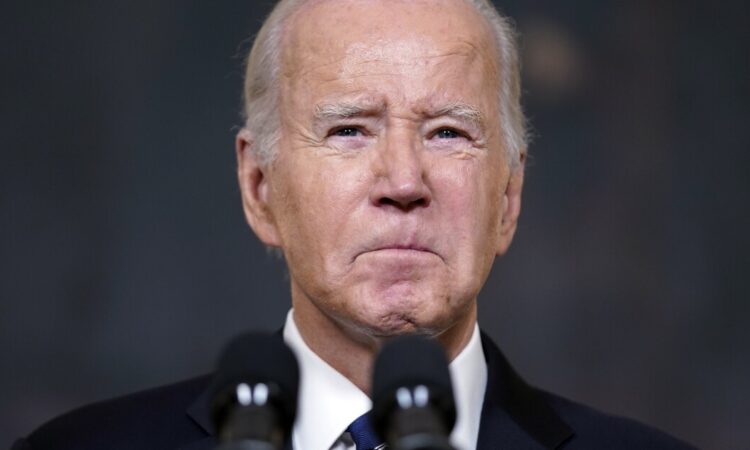
President Joe Biden’s decision to restart aid programs for Palestinians has drawn fresh criticism this week amid questions about how Hamas, the Palestinian terrorist organization in control of the Gaza Strip, acquired the resources to launch an attack on Israel.
Biden has pledged hundreds of millions of dollars toward Palestinians since taking office, reversing a decision by former President Donald Trump to cut off nearly all aid to Palestinians, in part because of concerns about Hamas’s influence.
ISRAEL WAR: FACT-CHECKING WHITE HOUSE TALKING POINTS ON IRAN AND HAMAS
Whether U.S. aid to Palestinians in Gaza and the West Bank ended up boosting organizations linked to terrorism remains a key question after Hamas fighters killed more than 1,000 Israelis, most of them civilians, in a surprise incursion into Israel on Saturday.
Less than a month before the attack, a Biden administration watchdog warned that there was not enough transparency surrounding the influx of funding that Biden approved for Palestinians starting when he took office in 2021.
The inspector general for the U.S. Agency for International Development raised concerns in a report last month that USAID officials had not properly accounted for the risks of providing aid in Gaza and the West Bank since Biden took office, including the risk of giving money to local groups that have ties to terrorism.
Among the problems identified by other international aid organizations was that local groups in Palestinian areas “are at risk of being designated as terrorist organizations” by the Israeli government. Other aid organizations and countries chose not to use those groups as local partners in their foreign aid projects, according to the report.
But a USAID official told the inspector general that “such restrictions reduce the number of potential partners available to the mission.”
The Biden administration appears to have given money to several groups with links to terrorism in Gaza and the West Bank, two territories entirely or partially under Palestinian control. Hamas controls the government in Gaza, while the Palestinian Authority governs in the Palestinian enclaves of the West Bank.
For example, the State Department sent $18,315 last year to a Gaza-based group, Natuf for Environment and Community Development, that is backed by a Palestinian bank that has faced U.S. sanctions and criticism from Israel for its ties to Hamas. The State Department grant was aimed at helping female entrepreneurs in Gaza.
The year before, the State Department sent the Natuf group $2,900 for an “art and graffiti therapy” project, a $19,996 grant for a program promoting “inclusive economic and educational partnerships for youth,” and a $19,806 grant to “raise the environmental awareness of the community.”
The Biden administration awarded $41,213 to a group, Fares Al-Arab, that has been linked to terrorism in Gaza, the Washington Examiner reported in February. The money was for a journalism program.
Fares Al-Arab has partnered with Hamas and pushed staunchly anti-Israel views.
Biden has also pledged significant new funding to the United Nations Relief and Works Agency for Palestine Refugees, or UNRWA, which has faced criticism for its many links to Hamas.
Trump cut off taxpayer funding to the UNRWA in 2018, but Biden reinstated it, pledging more than $200 million for the organization last year.
Critics have accused the UNRWA of promoting anti-Israel sentiments, allowing Hamas to use its resources, and working with terrorist-linked groups in Palestinian territories.
The UNRWA has worked closely with a United Kingdom-based charity, the Palestinian Relief and Development Fund, or Interpal, on projects in Gaza. In 2003, the Treasury Department first sanctioned Interpal for its ties to Hamas. The group appears to remain sanctioned in the United States.
In 2017, the UNRWA faced criticism when the chairman of its Palestinian workers union was allegedly elected to a Hamas leadership position. It was not the first time the group had been accused of employing people linked to Hamas. The agency suspended the union chairman.
Also in 2017, Hamas-built tunnels, used for transporting fighters and weapons in secret, were discovered under UNRWA schools, sparking calls for stronger oversight of the schools the relief agency was funding.
Israeli Prime Minister Benjamin Netanyahu has called for the agency to be dissolved.
Rep. Chip Roy (R-TX) and Sen. James Risch (R-ID) pushed legislation earlier this year that would cut U.S. funding to the UNRWA due to its “long history of employing those affiliated with Hamas” and its alleged promotion of antisemitism.
Their bill would require, among other things, that the relief agency sever ties with any group suspected by the U.S. of having financial links to terrorism.
But the Biden administration has shown no signs of slowing aid to the UNRWA or to Palestinians in Gaza — even though, privately, officials raised concerns in 2021 that restarting the aid programs Trump had ended could benefit Hamas.
CLICK HERE TO READ MORE FROM THE WASHINGTON EXAMINER
“We assess there is a high risk Hamas could potentially derive indirect, unintentional benefit from U.S. assistance to Gaza,” the State Department wrote in an internal document in March 2021, according to documents obtained by the Washington Free Beacon.
The State Department documents revealed that Biden administration officials discussed the need to request a sanctions waiver to send much of its funding to Palestinians to avoid violating anti-terrorism laws.






